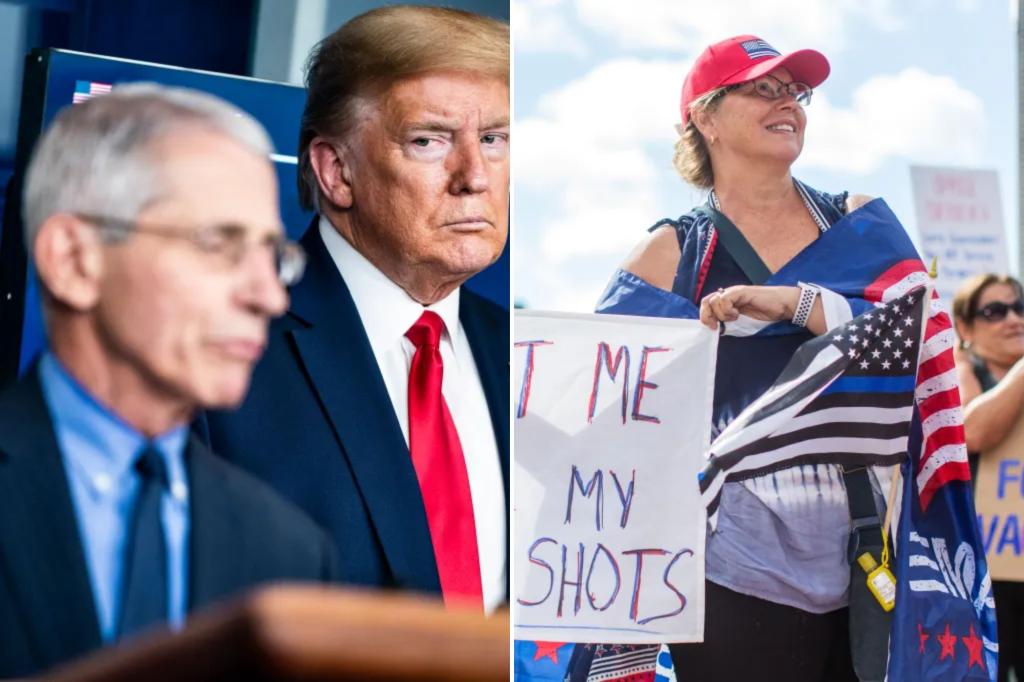World
Trump to sign order yanking federal funds for schools with COVID-19 vaccine mandates

President Trump to Sign Executive Order Barring Federal Funding for Schools Requiring COVID-19 Vaccines
President Trump is set to sign an executive order on Friday that will prohibit federal funding for schools and universities that require students to take COVID-19 vaccines. This move comes nearly five years after the novel coronavirus first emerged in the United States, leading to over 1 million deaths and significant disruptions to the economy, society, and the education system. The order, first reported by Breitbart News, reflects the ongoing political and cultural debates surrounding vaccine mandates in the U.S.
While highly effective COVID-19 vaccines were developed under Trump’s Operation Warp Speed initiative in late 2020, the Republican party has largely opposed vaccine mandates, particularly those imposed by federal, state, and local entities. This stance has been consistent with the broader Republican platform, which emphasizes individual freedom and limited government intervention in personal health choices.
The Evolution of COVID-19 Vaccines and Mandates
Over time, COVID-19 vaccines have become less effective at preventing the transmission of the virus, partly due to the emergence of newer, highly transmissible variants. However, these newer variants have also been generally less lethal than earlier versions of the virus. Despite this, the debate over vaccine mandates has remained contentious, with 21 states currently banning coronavirus vaccine requirements in schools, according to the National Academy for State Public Health. These states include both Republican strongholds, such as Texas and Florida, and Democratic-led jurisdictions like Arizona and Michigan.
The executive order signed by President Trump is the latest development in this ongoing debate. It represents a significant escalation of federal involvement in education policy, as it ties the allocation of federal funding to compliance with the administration’s stance on vaccine mandates. While the order is likely to be welcomed by those who oppose vaccine requirements, it has also sparked concerns among public health experts and educators who argue that such mandates are essential for protecting school communities from the spread of the virus.
Federal Funding as a Tool for Policy Influence
Federal funding has long been a mechanism for the U.S. government to influence education policies, even though education is primarily regulated at the state and local levels. For example, in 1994, the Senate passed a proposed rule that would have barred schools receiving federal funding from promoting “the promotion of homosexuality as a positive lifestyle alternative.” The measure was supported by then-Sen. Joe Biden, who later became president, but it ultimately did not become law after failing to gain approval from the House of Representatives.
This historical precedent highlights how federal funding has been used as a tool to shape educational policies and practices. By conditioning federal funding on compliance with certain requirements or prohibitions, the federal government can exert significant influence over issues that are otherwise under state and local jurisdiction. In the case of the current executive order, the Trump administration is leveraging this mechanism to advance its opposition to vaccine mandates in schools.
Broader Implications of the Executive Order
The full implications of President Trump’s executive order are not yet clear, particularly in terms of how much federal funding could be withheld from non-compliant schools and universities. The order is part of a broader effort by the Trump administration to reduce federal spending and limit the size and scope of government. For instance, Trump has authorized Elon Musk’s Department of Government Efficiency (DOGE) initiative, which aims to cut up to $1 trillion in annual federal spending through staff reductions and grant cuts. Early targets of this initiative include agencies such as USAID, the Consumer Financial Protection Bureau, and the Education Department, all of which the administration hopes to eliminate entirely.
By tying federal funding to compliance with its vaccine mandate policy, the Trump administration is sending a clear signal about its priorities. While supporters of the order argue that it protects individual freedoms and pushes back against overreach by federal and state authorities, critics warn that it could undermine public health efforts and create further divisions in an already polarized country.
The Ongoing Debate Over Vaccine Mandates
The executive order barring federal funding for schools requiring COVID-19 vaccines is part of a larger national conversation about the role of government in public health and education. Proponents of vaccine mandates argue that they are essential for ensuring the safety of students, teachers, and school communities, particularly in the face of a highly contagious and potentially deadly virus. They point to the success of similar mandates for other vaccines, such as measles and polio, in preventing outbreaks and protecting public health.
On the other hand, opponents of vaccine mandates argue that they infringe upon personal freedoms and parental rights. They contend that decisions about vaccination should be left to individuals and families, rather than being imposed by the government. This perspective has gained traction in many parts of the country, particularly in states with strong libertarian or conservative traditions.
Conclusion: A Complex and Contentious Issue
President Trump’s executive order barring federal funding for schools requiring COVID-19 vaccines reflects the complex and contentious nature of the debate over vaccine mandates in the U.S. While the order is likely to be celebrated by those who oppose such mandates, it has also raised concerns among public health experts and educators who believe that vaccination requirements are critical for safeguarding school communities.
As the nation continues to grapple with the aftermath of the COVID-19 pandemic, the issue of vaccine mandates in schools remains a deeply divisive and politically charged topic. The Trump administration’s decision to tie federal funding to compliance with its vaccine mandate policy is just the latest chapter in this ongoing debate. Whether this approach will ultimately succeed in achieving its intended goals—or whether it will lead to further polarization and conflict—remains to be seen.











